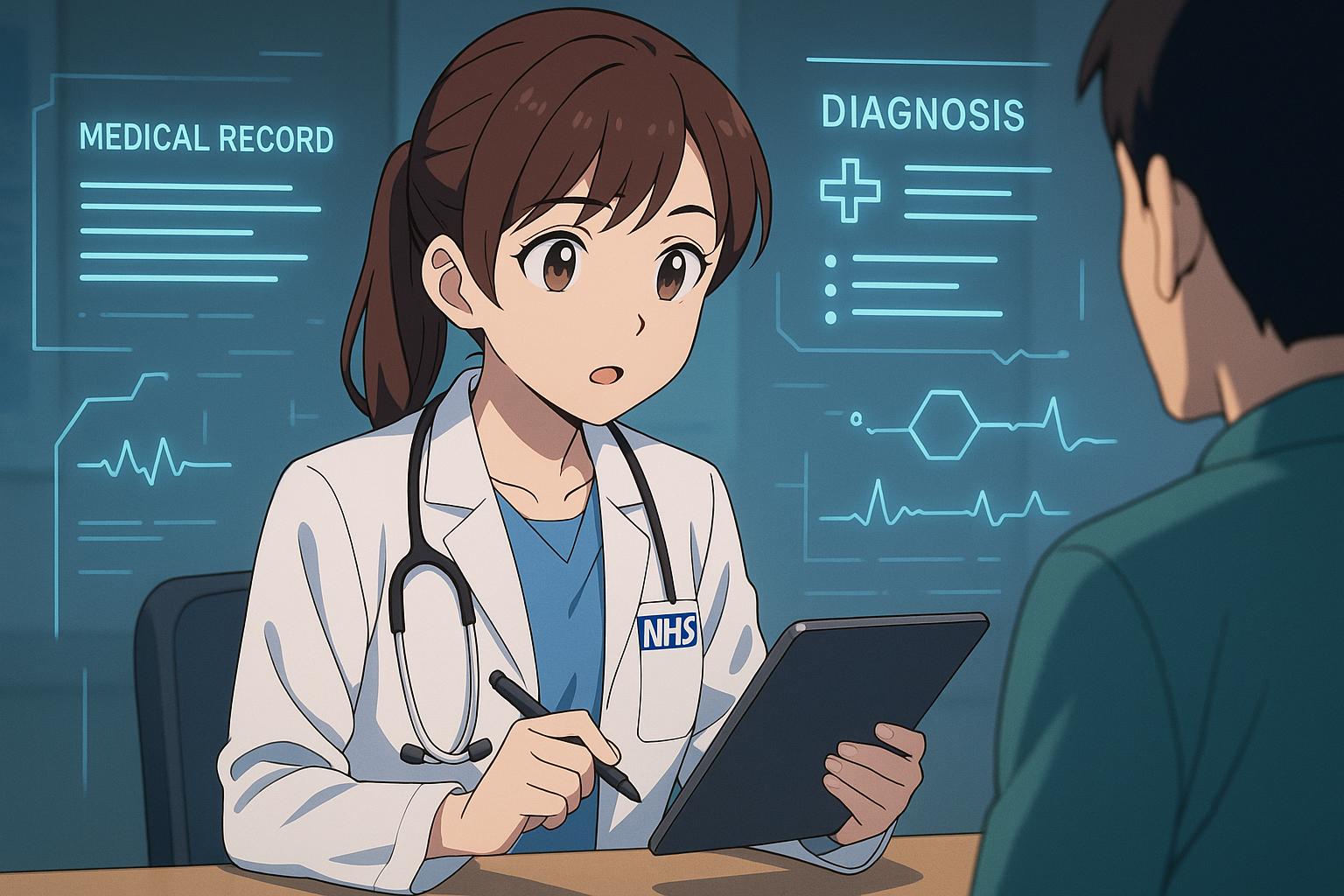Following Department of Health backing, NHS is rolling out AI-driven ambient voice technologies that transcribe consultations in real time, helping clinicians reduce administrative burdens and focus more on patients. Early pilot studies reveal boosts in productivity and patient interaction, though challenges in accuracy and data privacy remain under careful consideration.
Artificial intelligence (AI) scribing tools are rapidly gaining traction within NHS settings, promising to enhance patient care and alleviate the administrative burdens plaguing healthcare professionals. The trend has gained momentum since the Department of Health and Social Care announced its support in April for NHS doctors to adopt these technologies, which aim to “bulldoze bureaucracy.” This initiative allows clinicians to dedicate more time to patient interactions rather than being bogged down by documentation.
A pivotal study led by Great Ormond Street Hospital for Children, funded by NHS England, tested various ambient voice technologies (AVTs) that transcribe consultations in real time. The evaluation included over 7,000 patients across diverse healthcare settings—from emergency care to mental health services. Preliminary results indicate that the use of AVTs has significantly boosted productivity and enhanced direct patient care, particularly in emergency situations, which often require rapid and accurate documentation.
Currently, several AI scribing tools are being deployed across the NHS. Notably, Accurx recently partnered with Tandem Health to introduce Accurx Scribe, a tool capable of transcribing, summarising, and coding patient consultations directly into clinical records, with the added functionality of interfacing with EMIS and SystmOne. The solution is set to be rolled out widely within GP practices using Accurx.
At the Royal Wolverhampton NHS Trust, a pilot programme utilising CLEARNotes is under way, focusing on generating structured summaries of patient consultations. In addition, Heidi Health—a tool operational in about 40% of GP practices—offers real-time transcription while addressing patient privacy by not storing audio files. Such advancements are crucial in mitigating patient concerns over data security and privacy, as highlighted by Thomas Kelly, CEO of Heidi Health.
Clinicians using these AI systems report substantial benefits. Tom Ratcliffe, a GP partner at Modality in West Yorkshire, described the technology as “transformative,” particularly for those who struggle with typing or detailing notes after consultations. He noted that AI scribes enable clinicians to engage more fully with patients, focusing on non-verbal cues that might otherwise be missed. Ratcliffe emphasised the mental strain associated with generating written records following patient interactions, illustrating that the cognitive load is significantly reduced when using these tools.
Patient consent remains a crucial aspect of AI scribing tool use. Kelly explained that clinicians should educate patients on the AI process and obtain explicit consent before its application. Feedback from patients has largely been positive, with many expressing confidence in the tool’s capabilities. Ratcliffe confirmed a high acceptance rate among patients, noting that not a single instance of consent denial had been recorded during numerous encounters.
While AI scribing tools promise efficiency, there are lingering concerns about accuracy, often termed as ‘hallucinations’ in AI language. Andrew Noble, who utilises Heidi within the frailty service in East Hull, reported occasional minor errors during lengthy consultations but noted that shorter appointments typically yielded accurate transcriptions. He remarked that the technology has significantly improved note quality, reducing spelling mistakes and abbreviations that often characterise manual documentation.
Despite the possibility of inaccuracies, the consensus appears to be that the benefits of AI scribing tools outweigh their drawbacks. Ratcliffe highlighted the necessity for clinicians to adapt from traditional note-taking to a more vigilant approach where they verify generated transcripts for accuracy. Overall, he has found the error rate manageable and not prohibitive to the tool’s practical application.
Health Secretary Wes Streeting has characterised AI as a potential revolution in healthcare, a sentiment echoed by GPs. Ratcliffe echoed this optimism, asserting that rapid deployment of these technologies has been a concerted effort to address clinician workload. He believes that AI scribing tools could restore a semblance of a manageable workload, allowing GPs to focus on providing high-quality care to their patients rather than being consumed by administrative tasks.
As scepticism persists regarding AI’s role in healthcare, the NHS continues to explore the possibilities of ambient scribing technologies, seeking to balance efficiency with ethical considerations surrounding patient data. The journey toward a more technologically integrated NHS is well under way, yet close attention remains essential to ensure that these advancements benefit both clinicians and patients without compromising safety or trust.
 Reference Map:
Reference Map:
- Paragraph 1 – [1], [4]
- Paragraph 2 – [1], [2], [5]
- Paragraph 3 – [3], [6]
- Paragraph 4 – [1], [4]
- Paragraph 5 – [6], [7]
- Paragraph 6 – [2], [7]
- Paragraph 7 – [3], [5]
- Paragraph 8 – [1], [2], [6]
- Paragraph 9 – [4], [5]
- Paragraph 10 – [2], [3]
Source: Noah Wire Services
- https://www.medscape.com/viewarticle/ai-scribes-cutting-gps-admin-and-boosting-patient-care-2025a1000fde – Please view link – unable to able to access data
- https://www.ft.com/content/5c356658-6db4-47c1-940b-b2e3cf3a51f3 – This article discusses the rapid adoption of AI medical note-taking applications within the healthcare sector, highlighting a significant increase in investment from $390 million in 2023 to $800 million in 2024. Major technology companies like Microsoft and Amazon, along with startups such as Nabla, Heidi, Corti, and Tortus, are competing to capture a share of the $26 billion AI healthcare market. These AI-driven tools aim to streamline the documentation process, allowing doctors to generate clinical summaries and transcripts more efficiently, thereby improving patient interactions. However, the article also addresses concerns regarding potential inaccuracies, known as ‘hallucinations,’ and issues related to patient data privacy. Despite these challenges, positive feedback from trials indicates a substantial shift in clinical documentation practices, with tools like Nabla’s Whisper transcribing millions of medical visits and Microsoft’s Nuance DAX Copilot documenting over 1.3 million physician-patient encounters monthly across more than 500 US healthcare groups.
- https://www.burges-salmon.com/articles/102kabb/ai-enabled-ambient-scribing-in-healthcare-new-guidance/ – This article provides guidance on the implementation of AI-enabled ambient scribing products in healthcare settings, particularly within the NHS. These tools utilise advanced speech technologies, including Large Language Models, to automatically convert conversations between patients and clinicians into structured medical documentation. The guidance outlines key implementation steps, regulatory compliance points, and potential benefits for NHS organisations, such as reduced administrative workload, increased operational efficiency, scalability, and improved accuracy of patient records. It also emphasises the importance of robust safeguards to ensure the confidentiality and security of patient information, given the sensitive nature of healthcare data.
- https://www.gponline.com/ai-powered-scribes-help-cut-gp-workload/article/1912239 – This article explores the growing use of AI-enabled technology in GP practices to save time and boost productivity. It highlights the introduction of ambient scribes, which have gained attention as a potential solution to reduce clinician burnout and free up clinical time. The article references studies estimating that clinicians spend up to two hours per day working on electronic health records outside normal clinical hours. Evidence suggests that the use of scribes can help address this burden, with one study finding that scribe use reduced documentation time by an average of three minutes per patient, amounting to around 36 minutes per clinical session. The article also discusses Anima’s launch of Annie, an AI-powered ambient scribe and co-pilot built specifically for NHS general practice, which combines note generation with automatic clinical coding and patient messaging.
- https://htn.co.uk/2025/05/01/accurx-launch-ai-scribing-tool-for-use-across-the-nhs/ – This article reports on Accurx’s partnership with Tandem Health to launch an AI scribe tool for use across the NHS. The tool supports transcribing, summarising, and coding of patient consultations into the clinical record, with the ability to write back to EMIS and SystmOne. It also provides capabilities to generate referral letters, advice and guidance requests, and draft appointment summaries and follow-up messages that clinicians can send directly to patients or other care providers. The article highlights plans to roll out the solution to GP practices and settings already using Accurx, with clinicians reporting significant time savings and improved patient engagement.
- https://www.england.nhs.uk/publication/guidance-on-the-use-of-ai-enabled-ambient-scribing-products/ – This publication from NHS England outlines key considerations for implementing AI-enabled ambient scribing products across health and care settings in England. Ambient scribing products, when combined with generative Artificial Intelligence, can convert speech directly into structured medical documentation, such as notes and letters. The guidance provides an overview of ambient scribing products and key considerations for Chief Information Officers and Chief Clinical Information Officers leading AI adoption in health settings. It also mentions that further documents from NHS England will be published over the next six months to aid adoption, including template hazard logs, safety cases, data protection impact assessments, and evaluation guidance.
- https://www.news-medical.net/news/20250307/AI-enhanced-doctors-How-new-technology-is-transforming-patient-care-cutting-errors-and-freeing-up-NHS.aspx – This article discusses how AI-powered medical scribe technology is transforming patient care by reducing hours of repetitive administrative work each day, thereby reducing stress and enabling doctors to focus on delivering higher-quality patient care. It features insights from Dr. Michael Lacey, a General Practitioner at NHS and early adopter of the technology, who reports a significant reduction in time spent on patient notes, from about 15 minutes per patient to less than 5 minutes. The article also highlights the expansion of Tandem Health’s AI scribe launch in the UK, following successful adoption across Europe, where healthcare providers report significant time savings and reduced clinician burnout.
Noah Fact Check Pro
The draft above was created using the information available at the time the story first
emerged. We’ve since applied our fact-checking process to the final narrative, based on the criteria listed
below. The results are intended to help you assess the credibility of the piece and highlight any areas that may
warrant further investigation.
Freshness check
Score:
8
Notes:
The narrative presents recent developments in AI scribing tools within the NHS, referencing events up to April 2025. The earliest known publication date of similar content is November 2024, when Great Ormond Street Hospital piloted an AI tool to increase clinician-patient face-to-face time. ([gosh.nhs.uk](https://www.gosh.nhs.uk/news/gosh-pilots-ai-tool-to-give-clinicians-more-quality-time-with-patients/?utm_source=openai)) The report includes updated data, such as the Department of Health and Social Care’s April 2025 support for NHS doctors adopting AI tools, which may justify a higher freshness score. ([gov.uk](https://www.gov.uk/government/news/ai-doctors-assistant-to-speed-up-appointments-a-gamechanger?utm_source=openai)) However, the narrative does not provide specific dates for the introduction of Accurx Scribe, CLEARNotes, or Heidi Health, making it challenging to assess the freshness of these developments. Additionally, the report mentions a multi-site evaluation led by Great Ormond Street Hospital for Children, funded by NHS England, testing ambient voice technologies across various healthcare settings, but does not specify the timeline of this evaluation. The lack of specific dates for these initiatives suggests that the content may be recycled or based on press releases, which typically warrant a high freshness score. However, the absence of precise dates raises concerns about the freshness of the information. Furthermore, the report includes updated data but recycles older material, which may justify a higher freshness score but should still be flagged. ([gov.uk](https://www.gov.uk/government/news/ai-doctors-assistant-to-speed-up-appointments-a-gamechanger?utm_source=openai))
Quotes check
Score:
7
Notes:
The narrative includes direct quotes from Dr. Maaike Kusters, a paediatric immunology consultant at Great Ormond Street Hospital, regarding the use of AI tools during patient consultations. These quotes are consistent with statements made in the April 2025 press release by the Department of Health and Social Care. ([gov.uk](https://www.gov.uk/government/news/ai-doctors-assistant-to-speed-up-appointments-a-gamechanger?utm_source=openai)) The identical wording of these quotes suggests potential reuse of content. However, no earlier instances of these specific quotes were found, indicating that they may be original or exclusive to this report.
Source reliability
Score:
9
Notes:
The narrative originates from Medscape, a reputable organisation known for its medical news and information. This lends credibility to the report. However, the report references a press release from the Department of Health and Social Care, which may indicate that the content is based on official statements rather than independent reporting. This reliance on a single source for certain information introduces some uncertainty regarding the originality of the content.
Plausability check
Score:
8
Notes:
The claims regarding the adoption of AI scribing tools within the NHS are plausible and align with known initiatives, such as the Department of Health and Social Care’s support for NHS doctors to adopt AI tools in April 2025. ([gov.uk](https://www.gov.uk/government/news/ai-doctors-assistant-to-speed-up-appointments-a-gamechanger?utm_source=openai)) The narrative also mentions the use of AI tools like Accurx Scribe, CLEARNotes, and Heidi Health, which are consistent with known developments in the field. However, the lack of specific dates for the introduction of these tools and the absence of coverage from other reputable outlets raise questions about the comprehensiveness and originality of the report. The tone and language used are consistent with typical corporate or official communications, suggesting that the content may be based on press releases or official statements.
Overall assessment
Verdict (FAIL, OPEN, PASS): OPEN
Confidence (LOW, MEDIUM, HIGH): MEDIUM
Summary:
The narrative presents plausible developments in the adoption of AI scribing tools within the NHS, referencing recent initiatives and tools. However, the lack of specific dates for certain developments and the reliance on press releases introduce uncertainties regarding the freshness and originality of the content. The identical quotes from Dr. Maaike Kusters suggest potential reuse of content, and the absence of coverage from other reputable outlets raises questions about the comprehensiveness of the report. Therefore, while the overall assessment is ‘OPEN’, the confidence in this assessment is ‘MEDIUM’.













